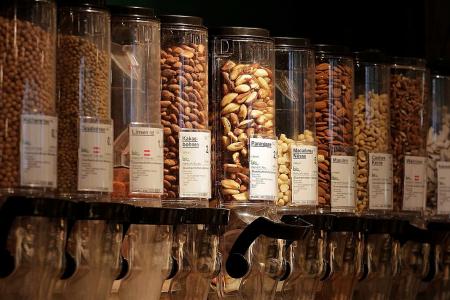Eat fats (in moderation) to lose weight
They help our body absorb nutrients and act as energy reserve
For a long time, we were all told to shun fats, and supermarkets responded with shelves upon shelves of products with the "fat-free" label emblazoned on it.
However, you will be making a big fat mistake by avoiding this nutrient if you are trying to maintain your weight.
For starters, fats play an important role in our body, acting as an energy reserve, protecting our organs and helping the body absorb and process nutrients. That is why we require some fats in our diet.
According to the Health Promotion Board, fats should make up 25 per cent to 30 per cent of our total energy intake.
If you are trying to shed the pounds, the fat that you consume should come from unsaturated sources (such as monounsaturated fat). Examples of such foods include fish, seeds, nuts and olive oil.
Besides improving heart health by removing low-density lipoprotein cholesterol - the "bad" cholesterol - from the arteries, these healthy foods also help you burn fat without having to cut calories.
CAN BOOST METABOLISM
The body requires three macronutrients for energy - carbohydrates, proteins and fats.
A gram of fat provides the body with twice the amount of energy of the other two.
Once the energy obtained from carbohydrates is spent, the body would turn to the calories from fats as a source of energy, leaning out the body.
Researchers at the Washington University School of Medicine in St. Louis, Missouri, found that stubborn "old" fat stored in the body's peripheral tissues around the belly, thighs and buttocks cannot be burned without the consumption of "new" dietary fats.
When consumed, the nutrient helps to break down the existing fat by activating PPAR-alpha (the protein that revs up metabolism) and fat-burning pathways through the liver.
CAN CURB SNACKING
Foods replete with healthy (unsaturated) fat such as nuts and avocado are more filling, preventing you from overeating.
According to researchers at the Spanish Society of Endocrinology and Nutrition, when fats are consumed, cholecystokinin and the gut hormone peptide YY is released.
These two hormones join forces to cause a decrease in appetite, suppress hunger and make you feel full.
But as with most things, moderation is key.
Healthy fat can help with weight loss but only if eaten in moderation. As fats are a concentrated source of calories, eating too much of them (even the good types) may lead to weight gain and obesity.
NEEDED FOR SOME VITAMINS
Many essential nutrients such as vitamins A, D, E and K are fat-soluble. Without fats, your body cannot absorb these nutrients.
This in turn results in vitamin deficiencies, which can bring on a whole host of problems such as dry skin, blindness, brittle bones and muscle pain.
Moreover, these vitamins are also crucial in maintaining energy, focus and muscle health, all of which work to maintain your weight.
Vitamin E, for instance, is a potent antioxidant that is essential for metabolic health, according to a study published in The Faseb Journal, a scientific journal.

This article first appeared on Her World Online (www.HerWorld.com).
Get The New Paper on your phone with the free TNP app. Download from the Apple App Store or Google Play Store now



